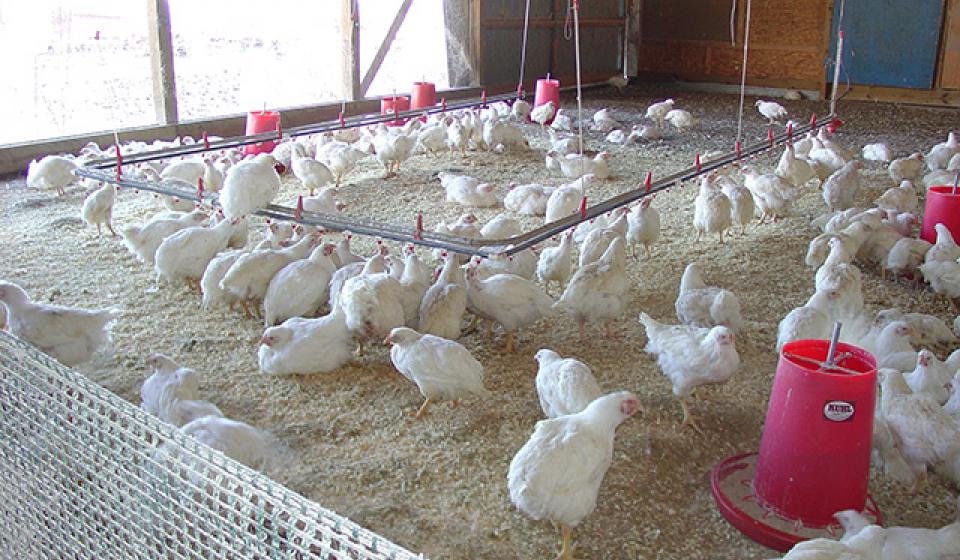Welcome to the UK Poultry Program
Poultry Instruction
Poultry Research
Poultry Extension Team
- Jacquie Jacob, Ph.D.
- Mike Ford
Poultry News & Events
Upcoming Events
- Sept. 3 - Poultry Poopology 101
- Nov. 4 - Raising black soldier fly larvae for feeding chickens
- Dec. 2 - Choice feeding as a management tool for chickens
News
- Animal Sciences Dean's List (Spring 2025)
6/13•UK Animal & Food Sciences - Thinking about raising chickens? University of Kentucky poultry expert says do your research
(Dr. Jacquie Jacobs)
6/6•WEKU - Alternative protein sources for poultry
(Dr. Jacquie Jacob)
6/5•Jacquie Jacob YouTube
Social Media
- "Like" Department of Animal and Food Sciences on Facebook
- "Like" Poultry extension on Facebook
- Watch Department of Animal and Food Sciences on YouTube
- Watch eXtension Poultry webinars on YouTube
- Watch Kentucky poultry extension webinars on YouTube
- "Follow" Department of Animal & Food Sciences on X.com (formerly Twitter)


![]()

Welcome to the University of Kentucky's poultry pages. Poultry is Kentucky's number 1 agricultural industry as well as the number one food commodity. Poultry production is a $900 million industry in Kentucky. Poultry production is also popular with small flock owners. Poultry are even kept in some cities, though in much-reduced numbers.
POULTRY refers to a group of domesticated birds kept for food (meat and/or eggs), fiber (feathers), entertainment (racing, exhibition, hunting, etc.), or work (messenger pigeons). This includes chickens, turkeys, ducks, geese, pigeons, guinea fowl, quail (Bobwhite or Japanese), ostrich, emus, etc.
If you have questions regarding poultry production or poultry products check out our extension publications. If you are interested in a career in the poultry industry you'll find what you need to know under undergraduate or graduate programs.
Two dead snow geese in Henderson County have tested positive for Highly Pathogenic Avian Influenza. While the CDC stresses that the risk to human health is very low, it is a problem for poultry in the area. This includes all flocks - large and small.
Avian Influenza detected in Henderson County waterfowl (wkyt.com)
Symptoms of HPAI in infected birds include incoordination, droopy wings, lethargy, unwillingness to fly, swimming in circles, and head tremors. The main concerns for the spread of the disease lie in domestic flocks, including chickens, turkeys, and ducks, though the disease has also been linked to recent large-scale deaths of eagles and vultures. Dr. Casey (Kentucky Department of Fish and Wildlife Resources veterinarian) shared that this outbreak is unique to those of the past, in that it has also spread to mammals, including one raccoon in Kentucky as well as several bears across North America.
As per the article by WYKT: Waterfowl hunters or people hiking through waterfowl habitats (wetlands, ponds, lakes, and streams) are encouraged to take precautions by wearing gloves, changing shoes, and disinfecting exposed tools or materials before coming into contact with poultry flocks or other domestic birds at home.
With waterfowl season still open, hunters are urged to follow routine precautions when handling wild game:
- Do not harvest, handle, or consume wild birds that are sick or otherwise found dead.
- Dress harvested waterfowl outside or in a well-ventilated area.
- Wear gloves and wash hands with soap and warm water after handling wild birds and disposing of carcasses. If soap and water are not available, use an alcohol-based hand sanitizer.
- Disinfect any equipment (knives and surfaces) that touch birds. Use dedicated tools for cleaning the game and avoid using them around poultry or pet birds.
- Do not eat, drink, or smoke when handling or cleaning game birds.
- Double bag the feathers and other remains. Tie the inner bag, take off your gloves, and leave them in the outer bag before tying it closed. Place the bag in the trash and close the lid on the receptacle. Discard in a trash can with a secure lid to prevent scavengers from getting the carcass.
- All game should be thoroughly cooked to an internal temperature of 165 degrees.
- Do not feed dogs raw or undercooked meat from harvested waterfowl.
If you have multiple bird deaths (wild or domestic), please contact the UK Animal Diagnostic Lab immediately. There is an after-hours contact number listed on their website if needed.
University of Kentucky's Veterinary Diagnostic Laboratory
USDA APHIS | 2022-2023 Highly Pathogenic Avian Influenza
Anyone involved with poultry production from the small backyard to the large commercial producer should review their biosecurity activities to ensure the health of their birds. APHIS has materials about biosecurity, including videos, checklists, and a toolkit available at https://www.aphis.usda.gov/aphis/ourfocus/animalhealth/animal-disease-information/avian/defend-the-flock-program/dtf-resources/dtf-resources.
In addition to practicing good biosecurity, all bird owners should prevent contact between their birds and wild birds and report sick birds or unusual bird deaths to State/Federal officials, either through their state veterinarian or through USDA’s toll-free number at 1-866-536-7593. Additional information on biosecurity for backyard flocks can be found at http://healthybirds.aphis.usda.gov.
Bird flu - Information for hunters and taxidermists
Bird flu - Identification and reporting
Bird flu - Considerations for pets and non-farm animals
